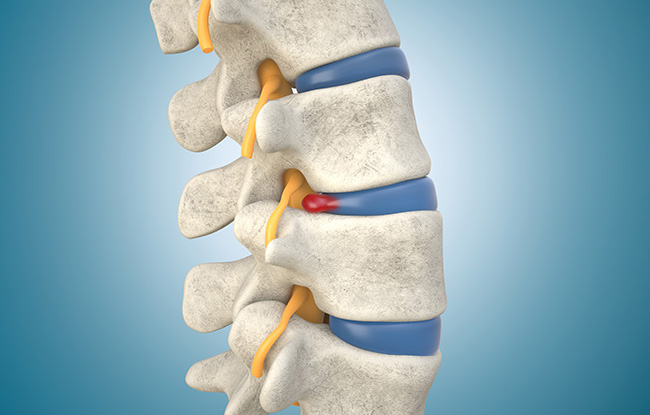Herniated Disc Raleigh
Herniated Disc
A human backbone is made of 33 vertebrae separated by spongy discs. These discs have a jelly-like substance (nucleus pulposus) at the center with a more rigid exterior. These discs act as a cushion for your spine, allowing movement in the spine. A herniated disc is when some of this nucleus is pushed outward through a tear in the annulus. It can happen anywhere in the spine but commonly occurs in the lower back. Depending on the position, it can result in pain, numbness, or weakness in the arms or legs. It is also likely that sometimes people have no symptoms and the ones that have can see their symptoms improve with time. Our care team ensures that patients receive personalized and effective treatment.

What Causes Herniated Disc?
Discs have a jelly-like substance called nucleus pulposus with a more rigid exterior. With time, the outer layer weakens and can crack. A herniated disc happens when the inner nucleus pulposus pushes through the crack. This leaked substance may press nearby spinal nerves. Several factors that can lead to the condition are –
- Aging
- Excessive weight
- Repetitive motions
- Sudden strain from improper lifting or other activities
How is Herniated Disc Diagnosed?
We aim to thoroughly evaluate, including medical history, family history, signs, or symptoms for the correct diagnosis. During the physical, we will assess your pain, reflexes, sensation, and muscle strength to find the source of pain. Any sore or painful spots are diagnosed to determine the cause. After physical examination, the patient undergoes some diagnostic tests to pinpoint the exact nerves aggravating the pain. Some of these tests include:
- X-rays – While an X-ray can’t show if you have a herniated disc, it shows your spine's outline and rules out whether any fracture or tumor causes it.
- CT scan – It combines several X-rays from different angles to create images of your spinal cord and the structures surrounding it.
- Myelogram – Dye helps determine the pressure exerted on the spinal cord.
- MRI – It creates 3-dimensional images of internal body structure to identify the location of herniated disc.
- EMG – It measures muscle response in response to a nerve’s stimulation of the muscle.
After a thorough evaluation, we will begin the personalized treatment process for pain management and get the patient back to their normal routine. So, get started and learn more about how our treatment methods can help you by scheduling an appointment with Advanced Pain Consultants, PA at (919) 800-0850.
